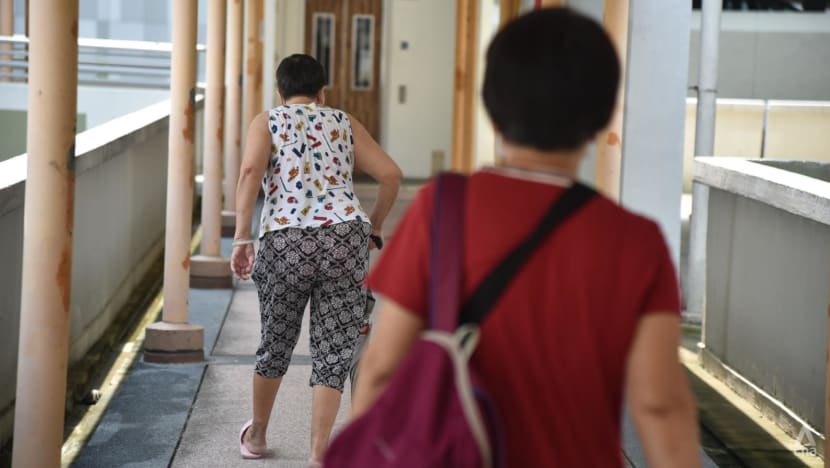Singapore to build new hospital in Tengah, expand home care initiatives to meet ageing population needs
A “virtual” ward programme will be offered by public hospitals from Apr 1.

An elderly woman walking alone in Singapore. (File photo: CNA/Syamil Sapari)

This audio is generated by an AI tool.
SINGAPORE: A new public hospital in Tengah, the expansion of a “virtual” ward model and upgrades to home-based care for seniors were among initiatives announced on Wednesday (Mar 6) to increase Singapore’s healthcare capacity and better support its ageing population.
The Ministry of Health (MOH) said it has begun planning for a new integrated general and community hospital in Tengah to serve the growing population in the western region of Singapore.
The hospital, which will be operated by the National University Health System, is targeted to be ready in the early 2030s. It will follow the ministry's plans to add 4,000 beds by 2030, Health Minister Ong Ye Kung said in parliament.
Together with an upcoming Eastern General Hospital Campus in Bedok, Singapore will have a total of 13 public acute hospitals and 12 community hospitals by the early 2030s, said MOH.
Additionally, from Apr 1, a pilot programme offering patients the option to be cared for in their own homes instead of a hospital ward will become a mainstream model of care in public healthcare institutions, said Mr Ong as he laid out his ministry's spending plans in parliament.
The Mobile Inpatient Care-at-Home (MIC@Home) pilot was launched in April 2022 as part of measures to alleviate tight bed capacity in public hospitals.
"Patients can be assured that they will not pay any more for this service than they do for acute inpatient care in a public hospital. All our hospitals intend to price MIC@Home similar to or lower than a normal ward," said Mr Ong.
MIC@Home patients will be supported by subsidies, MediShield Life and MediSave, "no different from a physical inpatient stay", he added.
The ministry aims to provide up to 300 MIC@Home "virtual" beds this year, which it sees as also "augmenting" bed capacity in public hospitals.
24/7 MONITORING FOR FALLS
Seniors who face mobility issues but lack family support will also benefit from improvements to the Home Personal Care service, which presently helps with daily living activities such as showering, feeding and housekeeping.
The enhanced service will include 24/7 technology-enabled monitoring and "response elements" to detect falls and incidents, so family members can be assured that their loved ones will receive timely help when needed, said MOH.
Caregivers who require respite care services can also tap the enhanced Home Personal Care for extended durations.
This upgraded service has been rolled out as a pilot at 11 places, including TOUCH Community Services' TOUCHpoint@AMK 433 and NTUC Health Co-operative's Active Ageing Hub at Kampung Admiralty, said MOH in response to CNA's queries.
The 11 sites were identified as they have a relatively higher senior density and are located across the island, the ministry said.
As of January, there are 328 clients enrolled under the pilot, said Second Minister for Health Masagos Zulkifli during his speech in parliament.
Seniors will also be able to choose the specific services under the enhanced Home Personal Care based on their needs.
MOH said it will evaluate the pilot by the end of this year before it considers expanding it across the country, adding that it will also review the costs of the different components of the enhanced service.
LIFESTYLE RECOMMENDATIONS, CARE PROTOCOLS
The ministry on Wednesday also announced steps to help residents better achieve their health goals, such as by giving more specific lifestyle recommendations over time.
Under Singapore’s healthcare reform initiative known as Healthier SG, residents are supported by their family doctors in developing a personalised Health Plan based on their health conditions.
"But the advice on lifestyle is quite generic, such as ‘please exercise more’," noted Mr Ong.
"In 2024, we will start to make the advice more specific. For example, it may recommend you do aerobic exercise three times a week."
The Health Plan will be updated based on health outcomes and care preferences; and also “continuously enhanced” to better support both theirs and their family doctors’ needs, said MOH.
In response to media queries on enrolment, a MOH spokesperson said 765,000 residents have enrolled in Healthier SG as of Feb 29.
Of these, about 484,000 residents are above 60 years old and about 281,000 residents are between 40 and 59 years old, the spokesperson added.
In addition, MOH will expand the range of care protocols to cover more conditions such as stable ischemic heart disease and stable stroke to better support family doctors in delivering preventive and chronic care. The ministry will start to roll them out in early 2025, said Mr Ong.
Care protocols provide family doctors with guidance based on evidence and support available in managing these conditions.
There are currently 12 care protocols focusing on preventive care and management of common chronic conditions such as diabetes and hypertension.
“With the care protocols, residents can be assured that care will be delivered in a consistent and coordinated manner, regardless of which Healthier SG clinic they choose to visit,” said MOH.


















